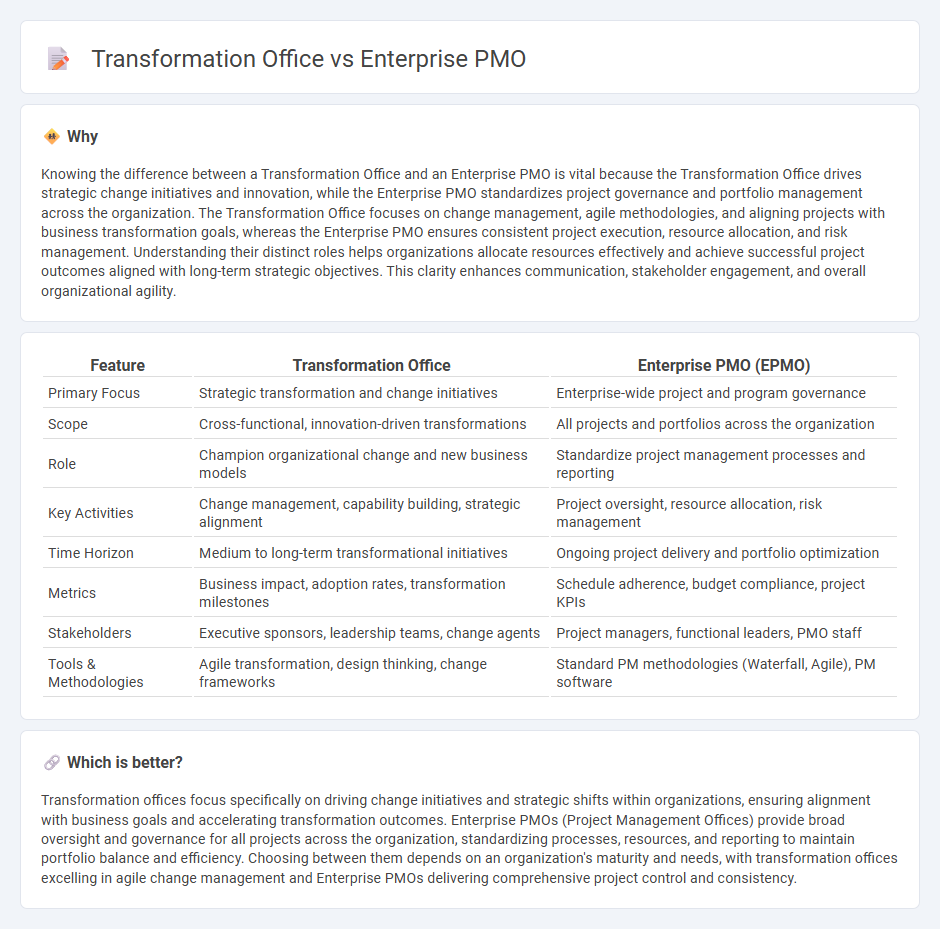
Transformation offices focus on driving strategic change initiatives with agile methodologies, ensuring alignment between organizational goals and execution. Enterprise PMOs standardize project management practices across the entire organization, enhancing governance, resource allocation, and portfolio oversight. Explore how each approach impacts your company's success and which model fits your transformation needs best.
Why it is important
Knowing the difference between a Transformation Office and an Enterprise PMO is vital because the Transformation Office drives strategic change initiatives and innovation, while the Enterprise PMO standardizes project governance and portfolio management across the organization. The Transformation Office focuses on change management, agile methodologies, and aligning projects with business transformation goals, whereas the Enterprise PMO ensures consistent project execution, resource allocation, and risk management. Understanding their distinct roles helps organizations allocate resources effectively and achieve successful project outcomes aligned with long-term strategic objectives. This clarity enhances communication, stakeholder engagement, and overall organizational agility.
Comparison Table
| Feature | Transformation Office | Enterprise PMO (EPMO) |
|---|---|---|
| Primary Focus | Strategic transformation and change initiatives | Enterprise-wide project and program governance |
| Scope | Cross-functional, innovation-driven transformations | All projects and portfolios across the organization |
| Role | Champion organizational change and new business models | Standardize project management processes and reporting |
| Key Activities | Change management, capability building, strategic alignment | Project oversight, resource allocation, risk management |
| Time Horizon | Medium to long-term transformational initiatives | Ongoing project delivery and portfolio optimization |
| Metrics | Business impact, adoption rates, transformation milestones | Schedule adherence, budget compliance, project KPIs |
| Stakeholders | Executive sponsors, leadership teams, change agents | Project managers, functional leaders, PMO staff |
| Tools & Methodologies | Agile transformation, design thinking, change frameworks | Standard PM methodologies (Waterfall, Agile), PM software |
Which is better?
Transformation offices focus specifically on driving change initiatives and strategic shifts within organizations, ensuring alignment with business goals and accelerating transformation outcomes. Enterprise PMOs (Project Management Offices) provide broad oversight and governance for all projects across the organization, standardizing processes, resources, and reporting to maintain portfolio balance and efficiency. Choosing between them depends on an organization's maturity and needs, with transformation offices excelling in agile change management and Enterprise PMOs delivering comprehensive project control and consistency.
Connection
The Transformation Office and Enterprise PMO are connected through their shared goal of driving organizational change and project execution excellence. The Transformation Office focuses on strategic change initiatives and aligning transformation objectives across the enterprise, while the Enterprise PMO standardizes project management practices and governance to ensure consistent delivery. Integration between both entities enhances transparency, resource allocation, and success rates of complex transformation programs.
Key Terms
Governance
Enterprise PMOs establish standardized governance frameworks to ensure consistent project execution and alignment with organizational goals across all business units. Transformation offices concentrate governance on change management, integration of strategic initiatives, and oversight of transformation-specific risks to drive business agility. Explore in-depth governance roles and best practices to enhance organizational effectiveness.
Change Management
Enterprise PMO primarily governs project execution, ensuring alignment with strategic goals and resource allocation, while transformation offices drive organizational change through comprehensive Change Management frameworks. Effective Change Management in a transformation office emphasizes stakeholder engagement, communication strategies, and continuous adoption monitoring to mitigate resistance and enhance transition success. Explore how integrating these approaches can optimize business transformation outcomes and create sustainable value.
Strategic Alignment
Enterprise PMOs prioritize strategic alignment by standardizing project management practices across the organization to ensure all initiatives support overarching business goals. Transformation offices concentrate on driving change through innovation management and agility, aligning transformational programs with evolving market demands and corporate vision. Discover how leveraging both structures can optimize strategic alignment and accelerate organizational success.
Source and External Links
Get Started with an EPMO Framework and Structure - An Enterprise PMO (EPMO) acts as a centralized governance body linking organizational strategy to project execution, enhancing project success by standardizing delivery, identifying risks, and aligning all projects with enterprise goals.
What Is Enterprise Project Management Office? (EPMO) - An EPMO is an executive-level department that oversees project portfolios, focusing on defining strategic objectives, governance development, and ensuring enterprise-wide project alignment.
Does Your Organization Need an Enterprise PMO? - The EPMO is a strategic enabler that provides governance, visibility, and best practices, helping executives allocate resources effectively, make portfolio decisions, and maintain alignment between strategy and project delivery.
 dowidth.com
dowidth.com